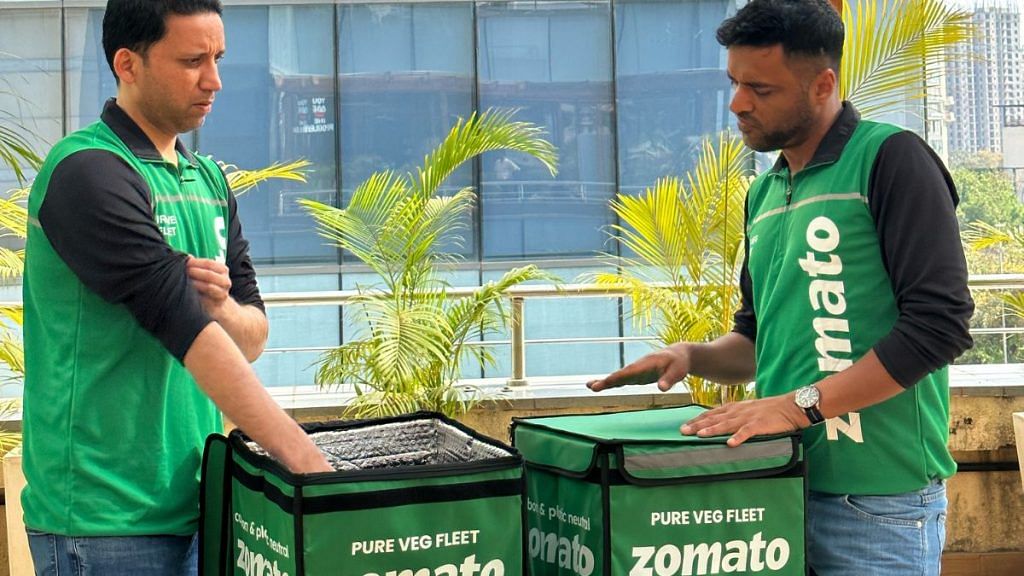Vegetarians desiring a separate kitchen for their meals is a notion that can be critiqued academically. But to rage over their personal choice of wanting to eat food prepared in a meat-free kitchen is unwarranted. Zomato’s plan for a pure veg fleet shouldn’t invite critique.
Vegetarianism in our country is largely defined by caste and associated with ‘purity’ or lack thereof. And Zomato’s decision has led to criticism for promoting puritanical practices. But Zomato is not taking away choice, it is in fact empowering people to pick the restaurants or the delivery services that they prefer. It should not be controversial.
The concept of ‘pure veg’ kitchens or restaurants is not novel in the country. In the reign of the Hindutva ideology, companies like Domino’s have also taken the controversial decision to not serve meat during Navratri in almost 500 of their outlets. Zomato, in the past, has suspended delivery of non-vegetarian food during the festival. But this is plain wrong and hurts the business of meat-serving restaurants, and delivery partners too.
But this new decision doesn’t seem to pose such risks.
Deepinder Goyal, CEO of Zomato, has already acted on feedback he’s gotten about the new plan—that using green uniforms to distinguish delivery partners carrying vegetarian food would lead to profiling, and could consequently turn into discriminatory behaviour by societies toward delivery partners carrying meat, and even customers who order meat. That distinction in the colour of the uniform has been rightly rescinded.
All these years Zomato and Swiggy have operated the same fleet for delivering meat and non-meat products without any large-scale backlash. So one has to assume that this decision by Goyal, which will lead to more logistical complications, has been made based on feedback from his customers. A businessman will not do anything that hampers their dhandha (business).
Also Read: Zomato ‘Kachra’ ad not an exception. Casteist campaigners are serial offenders
It’s not exclusionary
In a series of posts on X, Goyal didn’t shy away from addressing the backlash that he and the company received.
Goyal highlighted that oftentimes food spills in the boxes during delivery and the vegetarian order ends up smelling of meat. “And I promise, that if we see any significant negative social repercussions of this change, we will roll it back in a heartbeat,” Goyal wrote.
This decision is entirely different from introducing a different canteen for vegetarians and non-vegetarians as it happened at the Indian Institute of Technology Bombay. Separation of eating spaces leads to overt discrimination towards meat eaters and segregation of students whose politics is still in the nascent stages. That is an exclusionary practice. Separating delivery fleets as per dietary habits is not exclusionary. It is simply about respecting dietary preferences.
There are many vegetarians, like myself, who have no problem eating from restaurants or outlets which serve meat. Others have a different perspective. Oftentimes the smell of meat can be overbearing for a vegetarian. Their decision to not eat there is then driven by their olfactory responses, not necessarily because of caste bias. The behaviour of vegetarians is only condemnable when they question what’s on the plate of their peers, and refuse to be anywhere around it.
This is similar to people not eating at places which don’t serve halal meat or buying products from places which are vegan/cruelty-free. The availability of such restaurants/products helps consumers make informed choices in line with their personal beliefs.
So if a vegetarian wishes to eat from a vegetarian kitchen, it is simply their choice, and nobody should question their politics over it. A person can and should, without question, be able to decide what they put in their bodies.
There is also an old prank call by comedian Danish Sait that is going viral, where Sait pranks a vegetarian man in Bengaluru by tricking him into believing that he and his family had had chicken manchurian, instead of gobi manchurian. The man on the other end of the call loses his temper and hurls abuses at Sait. To tell someone that they’ve consumed meat when it is against their personal beliefs can be enraging. And a person is well within their rights to feel violated.
People can be vegetarian/vegan for several reasons– their caste location or religion, their love for animals, or their personal choice. For example, Novak Djokovic follows a plant-based diet, entirely for health reasons. But he doesn’t identify as vegan. And while a lot of people can question and debate the label, Djokovic wouldn’t care. He has 23 grand slams to confirm his choices.
Zomato’s decision gives their customer a choice and honours their personal belief. It is in no way stripping restaurants or delivery partners of their choice. It is not a policy that could lead to discrimination, especially after the decision to have separate-coloured fleets have been rolled back. It is a non-issue. Now people should go back to ordering whatever they want—biryani or veg biryani. No need to peek at anyone else’s plate.
Views are personal.
(Edited by Theres Sudeep)
